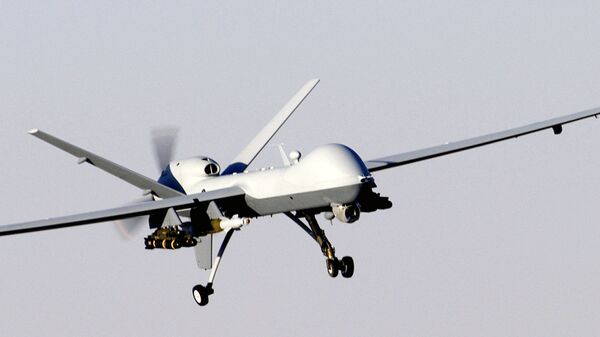Sputnik: How likely is it do you feel that the US will deploy drones in Niger? Is it likely to happen?
Richard Reeve: Well, they had drones in Niger for the past four and a half years. So that's going to continue, I mean they have very big plans to keep doing that, the question is whether they're going to arm those drones in the future. I think that is likely.
Sputnik: So with regard to that, the US already conducts drone strikes, I was alluding to it a second ago, in several of the countries, including Afghanistan, Pakistan, where they have already resulted in a staggering number of civilian casualties. What's your thoughts with regard to the efficiency of drone warfare?
Richard Reeve: The question is, in terms of efficiency: Does it achieve the desired result? If we think about it tactically: Does it destroy the target, kill the person they are looking for? Yes, it probably does; and at least, as accurately as using a cruise missile or manned aircraft. But looking at it strategically: Does that lessen the threat or the activity of armed or terrorist groups? No, because you tend kill civilians, increase recruitments to the armed groups you're targeting and the very presence of drone as the unseen killer has a rather radicalizing effects on local populations.
Sputnik: So what is the US interest in the African country of Niger? Can you just explain to Radio Sputnik listeners what the strategic interest the US has in the African country?
Richard Reeve: The US is interested in the wider region in terms of the operations there of jihadists groups, Al-Qaeda and more recently Islamic State. That is sort of Western front in the war on terror, in which France has really played the role a number of years. It's the largest presence in Niger, where as France is larger in Mali and Chad, on either side, for example. It's driven by a counterterrorism idea.
Sputnik:And how large is the US footprint in Africa now? And why the US is not transparent about what it is doing in Africa? I mean do you believe it is transparent, or does it still need to be much more transparent nowadays?
Richard Reeve: No, it's not very transparent. I mean it's a strategy that is driven by special operation forces, for a variety of missions, which range from quite simple training to more active combat support you'd see in Somalia and, to an extent, Libya as well. There's a great blurring deliberately in terms of what these forces across the continent are designed and mandated to do. These forces are in almost every war on the 54 countries of Africa. That's a big increase in the presence, particularly in the last decade or so, since the Africa Command, Africom, was set up. And they deliberately designed to be able to do a lot of different things, as demanded by the US leadership.

